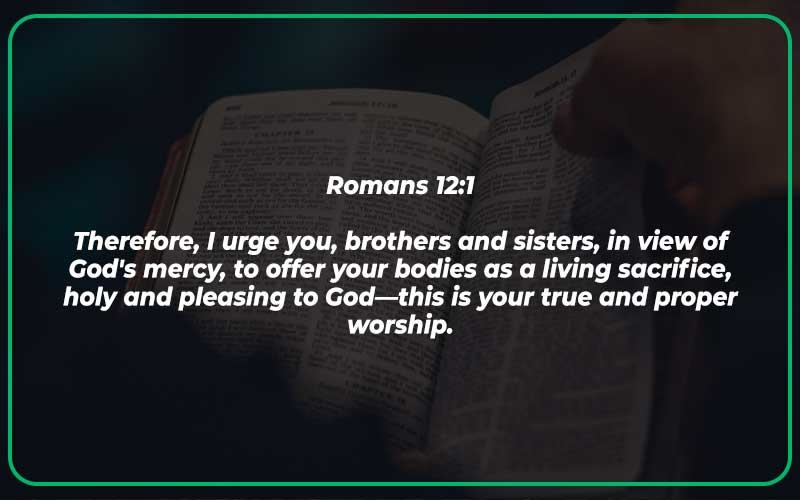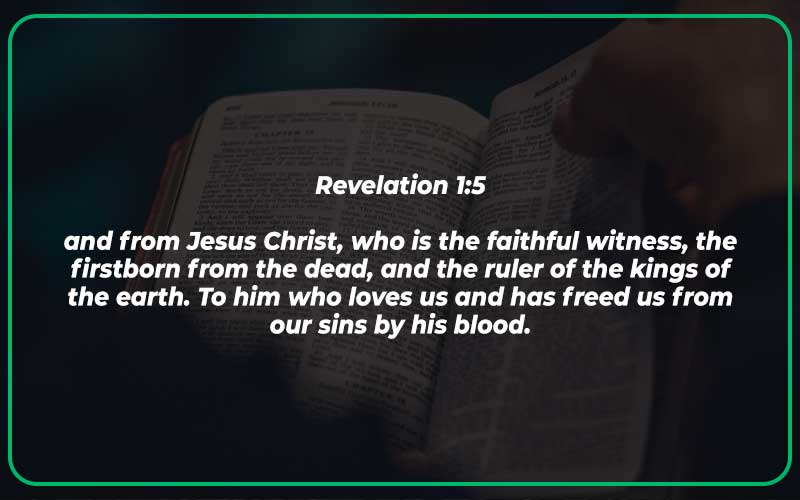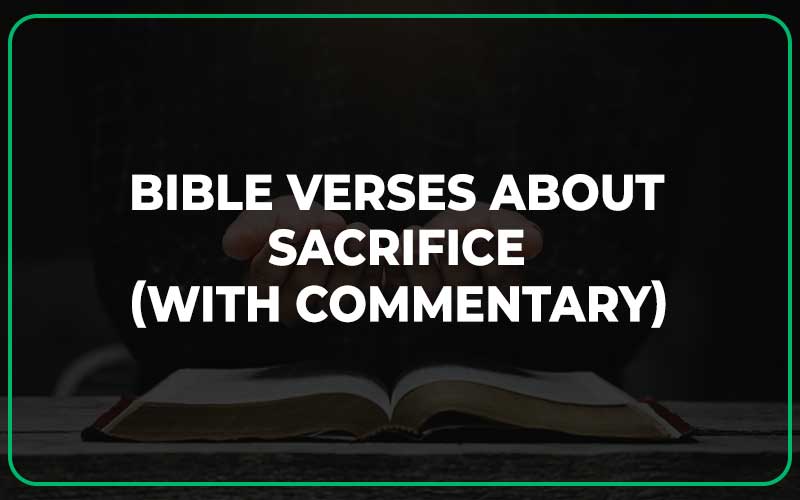Sacrifice is a fundamental concept in the Bible, with numerous verses emphasizing the importance of giving up something for a greater cause. It is a symbol of commitment, faith, and obedience to God.
Today, we will explore some of the most significant Bible verses about sacrifice and the lessons we can learn from them. Whether you are facing a difficult decision or seeking guidance on how to live a life of purpose, these verses will provide wisdom and inspiration.
Let’s dive in and discover the power and meaning behind sacrificing in the Bible.
Also Read: 23+ Bible Verses About Autumn (With Commentary)
Bible Verses About Sacrifice
Genesis 22:2
Then God said, “Take your son, your only son, whom you love—Isaac—and go to the region of Moriah. Sacrifice him there as a burnt offering on a mountain I will show you.”
This verse tells the story of Abraham being tested by God when asked to sacrifice his beloved son, Isaac. It shows the extent of Abraham’s faith and his willingness to offer up what was most precious to him.
Exodus 10:25
Moses said, “You must allow us to have sacrifices and burnt offerings to prepare for our sacrifices to the LORD our God.”
In this verse, Moses insists that the Israelites be allowed to worship God and make sacrifices to Him. It highlights the importance of sacrifice as an act of worship and devotion to God.
Leviticus 1:3-4
“If the offering is a burnt offering from the herd, you are to offer a male without defect. You must present it at the entrance to the tent of meeting so that it will be acceptable to the LORD.”
In the book of Leviticus, God gives specific instructions for various types of sacrifices. The burnt offering mentioned here required an unblemished male animal to be presented at the entrance to the tent of meeting. It emphasizes the need for a perfect sacrifice to be acceptable to the Lord.
Psalm 51:17
My sacrifice, O God, is a broken spirit; a broken and contrite heart you, God, will not despise.
This verse from Psalm 51 highlights the importance of a humble and repentant heart as a sacrifice to God. It emphasizes that God desires genuine repentance and a heart that is open and surrendered to Him.
Isaiah 53:7
He was oppressed and afflicted, yet he did not open his mouth; he was led like a lamb to the slaughter, and as a sheep before its shearers is silent, so he did not open his mouth.
This verse from the book of Isaiah prophesies about Jesus, who willingly sacrificed Himself for the salvation of humanity. It portrays Him as a lamb led to be slaughtered, emphasizing His submission to the Father’s will.
Matthew 10:38
Whoever does not take up their cross and follow me is not worthy of me.
Jesus speaks these words to His disciples, instructing them that following Him requires sacrifice. Taking up one’s cross symbolizes willingly embracing the challenges, hardships, and sacrifices that come with being His disciple.
Mark 8:35
For whoever wants to save their life will lose it, but whoever loses their life for me and for the gospel will save it.
In this verse, Jesus teaches that sacrificing one’s life for Him and the purpose of the gospel leads to true life and salvation. It emphasizes the idea that true fulfillment comes from surrendering to Jesus and His mission.
Luke 9:23
Then he said to them all: “Whoever wants to be my disciple must deny themselves and take up their cross daily and follow me.”
Similar to the previous verse, Jesus emphasizes the need for self-denial and taking up one’s cross daily to follow Him. Sacrificing personal desires and ambitions is essential in becoming His disciple.
John 3:16
For God so loved the world that he gave his one and only Son, that whoever believes in him shall not perish but have eternal life.
This well-known verse beautifully expresses God’s sacrifice of His Son, Jesus, for the redemption of humanity. It demonstrates the ultimate sacrifice made for the sake of love and eternal life.
Romans 12:1
Therefore, I urge you, brothers and sisters, in view of God’s mercy, to offer your bodies as a living sacrifice, holy and pleasing to God—this is your true and proper worship.
This verse encourages believers to offer their lives as a living sacrifice to God. It emphasizes that genuine worship involves presenting ourselves wholeheartedly to Him, living in obedience and surrender.

Galatians 2:20
I have been crucified with Christ and I no longer live, but Christ lives in me. The life I now live in the body, I live by faith in the Son of God, who loved me and gave himself for me.
In this verse, the apostle Paul affirms his identification with Christ’s crucifixion and resurrection. It speaks of the death of the old self and the new life lived in Christ, highlighting the sacrifice made by Jesus on our behalf.
Ephesians 5:2
And walk in the way of love, just as Christ loved us and gave himself up for us as a fragrant offering and sacrifice to God.
This verse urges believers to imitate Christ’s sacrificial love. It portrays Jesus’ offering of Himself as a fragrant sacrifice to God, emphasizing the pleasing and precious nature of His selfless act.
Philippians 2:17
But even if I am being poured out like a drink offering on the sacrifice and service coming from your faith, I am glad and rejoice with all of you.
Paul uses the metaphor of being poured out like a drink offering to describe his own sacrificial service in ministry. It highlights his joyful willingness to expend himself for the sake of others’ faith and growth.
Colossians 3:17
And whatever you do, whether in word or deed, do it all in the name of the Lord Jesus, giving thanks to God the Father through him.
This verse encourages believers to offer everything they do as a sacrifice of worship to God. It emphasizes the need to live intentionally and purposefully, recognizing that all actions should bring glory to the Lord.
Hebrews 9:26
But he has appeared once for all at the culmination of the ages to do away with sin by the sacrifice of himself.
This verse speaks of Jesus’ sacrifice of Himself as the ultimate solution for sin. It emphasizes the effectiveness and finality of His sacrifice in reconciling humanity with God.
James 1:27
Religion that God our Father accepts as pure and faultless is this: to look after orphans and widows in their distress and to keep oneself from being polluted by the world.
James emphasizes that true religion involves sacrificial acts of compassion and care for the marginalized, as well as personal purity. It encourages believers to sacrifice their own selfish desires for the well-being of others.
1 Peter 2:5
you also, like living stones, are being built into a spiritual house to be a holy priesthood, offering spiritual sacrifices acceptable to God through Jesus Christ.
In this verse, believers are compared to living stones being built into a spiritual house. It highlights our role as a holy priesthood, offering spiritual sacrifices that please and honor God through our relationship with Jesus Christ.
1 Peter 2:9
But you are a chosen people, a royal priesthood, a holy nation, God’s special possession, that you may declare the praises of him who called you out of darkness into his wonderful light.
Peter reminds believers of their identity as a chosen people and a royal priesthood. It emphasizes our role in declaring God’s praises, living sacrificially, and pointing others to the transformational power of God’s light.
1 Peter 3:18
For Christ also suffered once for sins, the righteous for the unrighteous, to bring you to God. He was put to death in the body but made alive in the Spirit.
This verse summarizes the sacrificial nature of Jesus’ death on the cross. It affirms that He suffered on behalf of the unrighteous to reconcile us with God, underlining the significance of His sacrifice for our salvation.
Revelation 1:5
and from Jesus Christ, who is the faithful witness, the firstborn from the dead, and the ruler of the kings of the earth. To him who loves us and has freed us from our sins by his blood.
In this verse, Jesus is acknowledged as the faithful witness who loves us and has freed us from our sins through His sacrifice. It points to His unique role and authority as the one who sets us free through His shed blood.

Revelation 5:12
In a loud voice they were saying: “Worthy is the Lamb, who was slain, to receive power and wealth and wisdom and strength and honor and glory and praise!”
This verse depicts a scene in heaven where the Lamb, referring to Jesus, is recognized as worthy to receive utmost power, wealth, wisdom, strength, honor, glory, and praise. It accentuates the value and magnitude of Jesus’ sacrifice on the cross.
What does the Bible say About Sacrifice?
Sacrifice is a prominent theme throughout the Bible, encompassing various forms and meanings. In the Old Testament, animal sacrifices were a central element of Jewish worship, symbolizing repentance, atonement, and dedication to God. The most significant example is the annual Yom Kippur, or Day of Atonement, where a scapegoat was chosen to bear the sins of the community.
However, the New Testament introduces a profound shift in understanding sacrifice. It emphasizes Jesus Christ as the ultimate and final sacrifice for humanity’s sins. His crucifixion is seen as the ultimate act of selfless giving, offering redemption and reconciliation with God.
Beyond literal sacrifices, the Bible also encourages believers to offer their lives as living sacrifices. Romans 12:1 speaks of presenting one’s body as a living sacrifice, holy and pleasing to God, as an act of spiritual worship. This metaphorical sacrifice involves dedicating one’s life, talents, and resources to serve God and others.
Throughout the Bible, sacrifice is viewed as an expression of devotion, obedience, and love for God, often accompanied by a willingness to surrender personal desires for a higher purpose. It serves as a powerful reminder of the cost and commitment associated with following a faith-driven life.

